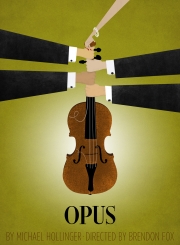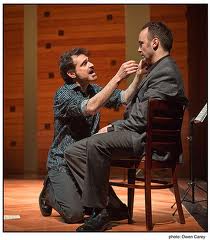Last Sunday we saw the play "Opus" at Portland Center Stage (PCS). Written by a violinist, Michael Hollinger, the one-act, 90-minute "Opus" chronicles a few weeks in the life of a string quartet. As described in the playbill, a string quartet is unlike other close teams because it has no one person in charge and no conductor. Each musician has an equal voice, and only when all of the voices are playing in perfect harmony does beautiful music result. Many great quartets throughout history have self-destructed...because it's hard to get along, whether you play chamber music or rock (like The Beatles). And notably harder if you have an ego (or four of them).
I've described myself previously as a lazy musician. I have a good ear and I rely too much on it. I can make up harmonies with the best of them, and I have the ability to make music on a variety of instruments (except for woodwinds and brass!). But I didn't pursue music very seriously as a young woman because I couldn't stand the egos of many serious musicians. PLU has an excellent music program, but with the exception of singing in choir my freshman year and taking some voice lessons, I veered away from it because of the egos and extremely competitive nature of the music program. It's unfortunate, because I could have learned a great deal and improved my voice, not to mention learned music theory.
As a former violinist and cellist myself, I was looking forward to this play. It did actually make me wish I still played my violin. (Perhaps one day I will pick it up again.) I especially looked forward to seeing Chris Coleman, PCS's artistic director for 11 years, on the Portland stage for the first time. He played Elliot, the lead violinist, and I thoroughly enjoyed observing his artistry on stage instead of behind the scenes.
When the play begins, the quartet has four men--two of whom (Coleman's controlling Elliot and the violist, Dorian) are lovers. The cellist and second violinist are a bit more even-tempered. Dorian is one of those brilliant artists who brings out the best music in the others but it terribly difficult to get along with at times. He desperately wants to play violin, but Elliot decides--and the others agree--that it would be more practical to have Elliot play first violin. Inevitably, the two fall out and the quartet is at risk. Dorian runs away and the remaining trio conduct auditions for a new violist, eventually filled by new member Grace. Introduce some estrogen into a testosterone-charged quartet, and the rules of engagement change immediately.
None of the actors actually actually played the instruments--they had been coached by musicians--and at times I found that to be distracting. Some of them, especially Coleman, were more skilled at faking the instruments than the others (Sarah Stevens as Grace was less skilled at this charade). I imagine it's similar to Mike attending plays in the U.S. and enduring poorly put-on British accents.
However, beyond the lack of actual playing, I found the actors to be completely believable as classical musicians. The quartet is invited to play the performance of a lifetime at the White House and they choose the immensely challenging Beethoven piece, Opus 131. Unusual for us, I anticipated the final climactic scene (I will not share any spoilers here) and Mike hadn't...I could see it coming much earlier in the play. The play closes this weekend, so time is running out! "Opus" will make you want to learn to play the violin (or cello or viola), or pick up the one you put away in storage (like me). Here's the trailer:
Opus Trailer from Portland Center Stage on Vimeo.
Yet another winner at Portland Center Stage, and I'm eagerly anticipating the next music-themed play we will see at PCS, One Night with Janis Joplin!
I've described myself previously as a lazy musician. I have a good ear and I rely too much on it. I can make up harmonies with the best of them, and I have the ability to make music on a variety of instruments (except for woodwinds and brass!). But I didn't pursue music very seriously as a young woman because I couldn't stand the egos of many serious musicians. PLU has an excellent music program, but with the exception of singing in choir my freshman year and taking some voice lessons, I veered away from it because of the egos and extremely competitive nature of the music program. It's unfortunate, because I could have learned a great deal and improved my voice, not to mention learned music theory.
As a former violinist and cellist myself, I was looking forward to this play. It did actually make me wish I still played my violin. (Perhaps one day I will pick it up again.) I especially looked forward to seeing Chris Coleman, PCS's artistic director for 11 years, on the Portland stage for the first time. He played Elliot, the lead violinist, and I thoroughly enjoyed observing his artistry on stage instead of behind the scenes.
When the play begins, the quartet has four men--two of whom (Coleman's controlling Elliot and the violist, Dorian) are lovers. The cellist and second violinist are a bit more even-tempered. Dorian is one of those brilliant artists who brings out the best music in the others but it terribly difficult to get along with at times. He desperately wants to play violin, but Elliot decides--and the others agree--that it would be more practical to have Elliot play first violin. Inevitably, the two fall out and the quartet is at risk. Dorian runs away and the remaining trio conduct auditions for a new violist, eventually filled by new member Grace. Introduce some estrogen into a testosterone-charged quartet, and the rules of engagement change immediately.
None of the actors actually actually played the instruments--they had been coached by musicians--and at times I found that to be distracting. Some of them, especially Coleman, were more skilled at faking the instruments than the others (Sarah Stevens as Grace was less skilled at this charade). I imagine it's similar to Mike attending plays in the U.S. and enduring poorly put-on British accents.
However, beyond the lack of actual playing, I found the actors to be completely believable as classical musicians. The quartet is invited to play the performance of a lifetime at the White House and they choose the immensely challenging Beethoven piece, Opus 131. Unusual for us, I anticipated the final climactic scene (I will not share any spoilers here) and Mike hadn't...I could see it coming much earlier in the play. The play closes this weekend, so time is running out! "Opus" will make you want to learn to play the violin (or cello or viola), or pick up the one you put away in storage (like me). Here's the trailer:
Opus Trailer from Portland Center Stage on Vimeo.
Yet another winner at Portland Center Stage, and I'm eagerly anticipating the next music-themed play we will see at PCS, One Night with Janis Joplin!



Comments
Post a Comment